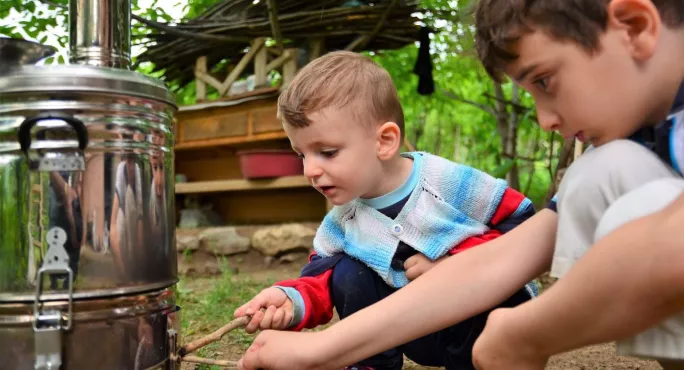- Home
- Why are we so reluctant to take learning into the outdoors?
Why are we so reluctant to take learning into the outdoors?

New things are scary - like tackling long division or trying to spell “photosynthesis” for the first time. But trying new things is how we learn, develop and grow as people, and setting challenges is how we teach.
It is the same when children play outside, whether climbing a tree, building a den or tending a fire for the first time. These new challenges are all lessons, too.
Outdoor play and learning, from an early age through to young adulthood, helps children to understand the world around them and develop skills and attributes which boost creativity, imagination and their ability to learn. You can teach maths outside, but being outdoors can also help you teach in the classroom. And then there are the health, wellbeing and emotional benefits of playing outdoors, which all contribute to more engaged learners.
A teacher’s view: ‘It’s time for schools to embrace outdoor learning’
Long read: Confronting risk with pupils in the Scottish mountains
Why are we all so risk-averse? Surely the idea of living a life in bubble-wrap is even scarier
Unfortunately, when it comes to formal education settings, we are reluctant to take playing - and learning - outside.
Much of that reluctance comes from one four-letter word: risk. When adults hear the words “risk” or “risky play”, we retreat. A study from King’s College London found that teacher confidence was a key reason that children weren’t playing and learning outdoors while at school: the risks can seem too high.
But life is full of risks. We all take risks every day; some big and some small. The ability to do so, to understand our boundaries and capabilities and to bounce back from failure, is a vital part of our development that allows us to learn and to navigate the risks inherent in existing.
Playing outdoors is one of the key ways in which we all come to understand how to balance potential harm with opportunities for fun, adventure, learning and friendship.
What we need is a rebrand: less “risk” and more “adventure”. In reconceiving risk, we can give ourselves the confidence to get outside - to give our children a varied and world-class education, and to make teaching itself more fun.
When we’re talking about risky play, we’re really talking about opportunities for adventure and a chance to learn.
There is risk in climbing trees, in crossing streams, in getting up close and personal with creepy crawlies. But, more importantly, there is fun and the ingredients for new and imaginative worlds where our children are intrepid explorers. In these exciting and interactive environments, children can be active participants in their learning and shape their own boundaries.
Children also learn to be resilient - to pick themselves up when they fall and keep playing when they lose a game. It has an amazing effect on their development and confidence. Just like with long division, we might get it wrong the first time, but we take a risk, try again, and learn to succeed.
In Scotland, there is a movement for these outdoor experiences to be an everyday part of how our children grow up.
We, alongside the Scottish government and the Care Inspectorate, recently launched a guide called Out to Play which offers childcare providers a wealth of information and practical guidance for creating outdoor play experiences in early learning and childcare.
With information on everything from obtaining permission to use land, to staying safe in the dark (and, yes, risk assessment), we hope anxieties will be allayed and questions answered. That way nursery leaders and childcare providers can be more confident and better equipped to get the children in their care outdoors.
It’s vital that our kids get out to play to build the foundations of life-long learning and curiosity. So let’s take a risk, and get out to play. Better yet, let’s have an adventure.
Rachel Cowper is programme manager for Inspiring Scotland’s Thrive Outdoors fund. Inspiring Scotland is a venture philanthropy organisation that seeks to tackle poverty and disadvantage
Reference: Improving and encouraging teacher confidence in out-of-classroom learning: the impact of the Hampshire Trailblazer project on 3-13 curriculum practitioners (Nundy, Stuart; Dillon, Justin; Dowd, Patrick, in Education 3-13, Vol. 37, No. 1, 2009, pages 61-73)
Register with Tes and you can read two free articles every month plus you'll have access to our range of award-winning newsletters.
Keep reading with our special offer!
You’ve reached your limit of free articles this month.
- Unlimited access to all Tes magazine content
- Save your favourite articles and gift them to your colleagues
- Exclusive subscriber-only stories
- Over 200,000 archived articles
- Unlimited access to all Tes magazine content
- Save your favourite articles and gift them to your colleagues
- Exclusive subscriber-only stories
- Over 200,000 archived articles